This article was medically reviewed by Jeremy Bartz, PhD and by wikiHow staff writer, Amy Bobinger. Dr. Jeremy Bartz is a Clinical Psychologist in private practice based in Los Angeles, California. Dr. Bartz specializes in treating depression, anxiety, OCD, mind-body syndromes, chronic pain, insomnia, relationship difficulties, attachment trauma, and resolving the effects of narcissistic trauma. He received a Ph.D. in Counseling Psychology from Brigham Young University and completed a fellowship In Pain Psychology at Stanford's premier pain management clinic.
There are 24 references cited in this article, which can be found at the bottom of the page.
This article has been viewed 501,273 times.
You're in lying awake in bed, and you want nothing more than to slip off to dreamland—but what do you do when you just can't fall asleep? Everyone experiences trouble sleeping sometimes, but it's still frustrating when it happens to you. Fortunately, there are a few tricks that may help you drift off more easily. If those don't work, you might need to make a few lifestyle changes to help your body regulate its sleep/wake cycle.
Steps
Expert Q&A
Did you know you can get expert answers for this article?
Unlock expert answers by supporting wikiHow
-
QuestionWhat are some long-term strategies that will make falling asleep every night easier?
 Jeremy Bartz, PhDDr. Jeremy Bartz is a Clinical Psychologist in private practice based in Los Angeles, California. Dr. Bartz specializes in treating depression, anxiety, OCD, mind-body syndromes, chronic pain, insomnia, relationship difficulties, attachment trauma, and resolving the effects of narcissistic trauma. He received a Ph.D. in Counseling Psychology from Brigham Young University and completed a fellowship In Pain Psychology at Stanford's premier pain management clinic.
Jeremy Bartz, PhDDr. Jeremy Bartz is a Clinical Psychologist in private practice based in Los Angeles, California. Dr. Bartz specializes in treating depression, anxiety, OCD, mind-body syndromes, chronic pain, insomnia, relationship difficulties, attachment trauma, and resolving the effects of narcissistic trauma. He received a Ph.D. in Counseling Psychology from Brigham Young University and completed a fellowship In Pain Psychology at Stanford's premier pain management clinic.
Sleep Specialist
-
QuestionI was just on my iPad and now I can't fall asleep.
 Luba Lee, FNP-BC, MSLuba Lee, FNP-BC is a Board-Certified Family Nurse Practitioner (FNP) and educator in Tennessee with over a decade of clinical experience. Luba has certifications in Pediatric Advanced Life Support (PALS), Emergency Medicine, Advanced Cardiac Life Support (ACLS), Team Building, and Critical Care Nursing. She received her Master of Science in Nursing (MSN) from the University of Tennessee in 2006.
Luba Lee, FNP-BC, MSLuba Lee, FNP-BC is a Board-Certified Family Nurse Practitioner (FNP) and educator in Tennessee with over a decade of clinical experience. Luba has certifications in Pediatric Advanced Life Support (PALS), Emergency Medicine, Advanced Cardiac Life Support (ACLS), Team Building, and Critical Care Nursing. She received her Master of Science in Nursing (MSN) from the University of Tennessee in 2006.
Board-Certified Family Nurse Practitioner
-
QuestionWhat if you have bad feelings and you can't sleep?
 Luba Lee, FNP-BC, MSLuba Lee, FNP-BC is a Board-Certified Family Nurse Practitioner (FNP) and educator in Tennessee with over a decade of clinical experience. Luba has certifications in Pediatric Advanced Life Support (PALS), Emergency Medicine, Advanced Cardiac Life Support (ACLS), Team Building, and Critical Care Nursing. She received her Master of Science in Nursing (MSN) from the University of Tennessee in 2006.
Luba Lee, FNP-BC, MSLuba Lee, FNP-BC is a Board-Certified Family Nurse Practitioner (FNP) and educator in Tennessee with over a decade of clinical experience. Luba has certifications in Pediatric Advanced Life Support (PALS), Emergency Medicine, Advanced Cardiac Life Support (ACLS), Team Building, and Critical Care Nursing. She received her Master of Science in Nursing (MSN) from the University of Tennessee in 2006.
Board-Certified Family Nurse Practitioner
References
- ↑ https://www.ncbi.nlm.nih.gov/pmc/articles/PMC6361823/
- ↑ https://www.sleepfoundation.org/insomnia/treatment/what-do-when-you-cant-sleep
- ↑ https://www.unr.edu/counseling/virtual-relaxation-room/using-visualization-to-relax-and-sleep-better
- ↑ https://www.news-medical.net/health/Using-Pressure-Points-to-Get-a-Better-Nighte28099s-Sleep.aspx
- ↑ Jeremy Bartz, PhD. Clinical Psychologist. Expert Interview. 8 January 2021.
- ↑ https://accelerate.uofuhealth.utah.edu/explore/practice-body-scan
- ↑ https://www.psychologytoday.com/us/blog/the-power-imagination/200909/sleep-tonight-using-imagery-create-soothing-blanket-sleep
- ↑ https://sleep.org/articles/learning-relax/
- ↑ https://www.ncbi.nlm.nih.gov/books/NBK279320/
- ↑ https://www.hopkinsmedicine.org/health/wellness-and-prevention/up-in-the-middle-of-the-night-how-to-get-back-to-sleep
- ↑ https://www.nhs.uk/live-well/sleep-and-tiredness/10-tips-to-beat-insomnia/
- ↑ https://www.nhs.uk/live-well/sleep-and-tiredness/how-to-get-to-sleep/
- ↑ http://www.nytimes.com/2007/09/04/health/04real.html?_r=0
- ↑ https://www.ncbi.nlm.nih.gov/pmc/articles/PMC2995283/
- ↑ https://www.hopkinsmedicine.org/health/wellness-and-prevention/melatonin-for-sleep-does-it-work
- ↑ https://pubmed.ncbi.nlm.nih.gov/23853635/
- ↑ https://www.mayoclinic.org/healthy-lifestyle/nutrition-and-healthy-eating/expert-answers/magnesium-supplements/faq-20466270
- ↑ https://www.nhs.uk/live-well/sleep-and-tiredness/10-tips-to-beat-insomnia/
- ↑ Jeremy Bartz, PhD. Clinical Psychologist. Expert Interview. 8 January 2021.
- ↑ https://www.nhs.uk/live-well/sleep-and-tiredness/10-tips-to-beat-insomnia/
- ↑ https://www.sleepfoundation.org/insomnia/treatment/what-do-when-you-cant-sleep
- ↑ https://www.mayoclinic.org/diseases-conditions/insomnia/symptoms-causes/syc-20355167
- ↑ https://www.sleepfoundation.org/insomnia/treatment/what-do-when-you-cant-sleep
- ↑ https://sleep.org/articles/design-the-perfect-bedroom/
- ↑ https://www.nia.nih.gov/health/good-nights-sleep
- ↑ https://www.nhs.uk/live-well/sleep-and-tiredness/10-tips-to-beat-insomnia/
- ↑ https://www.nia.nih.gov/health/good-nights-sleep
- ↑ Jeremy Bartz, PhD. Clinical Psychologist. Expert Interview. 8 January 2021.
- ↑ http://www.mayoclinic.org/healthy-lifestyle/adult-health/in-depth/sleep/art-20048379?pg=2
- ↑ https://www.mayoclinic.org/diseases-conditions/insomnia/symptoms-causes/syc-20355167
About This Article
To fall asleep, take 5 deep breaths and focus on the present moment, like the way the sheets feel against your skin. You can also relieve tension by pulling your toes inward, holding for a count of 10 and releasing them, then repeating 10 times. If you’ve been trying to fall asleep for a while but can’t, leave the room to do something relaxing, like reading a book. Once you’re tired, return to your bed, which can help you associate your room with sleep. Alternatively, try drinking herbal tea like chamomile, which can help you relax. For more tips from our Nursing reviewer, like how to do a full body scan to help you sleep, read on!
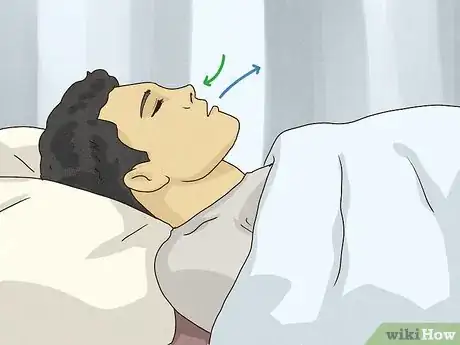
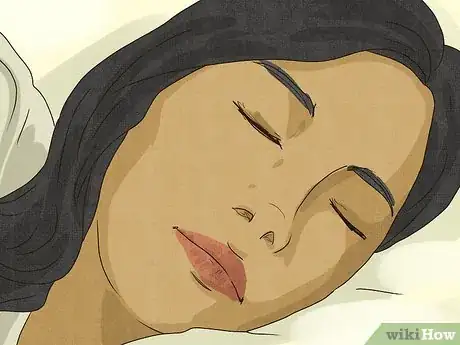
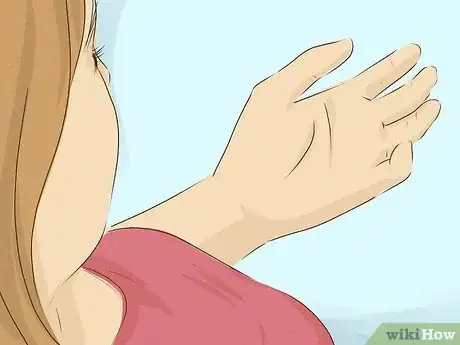
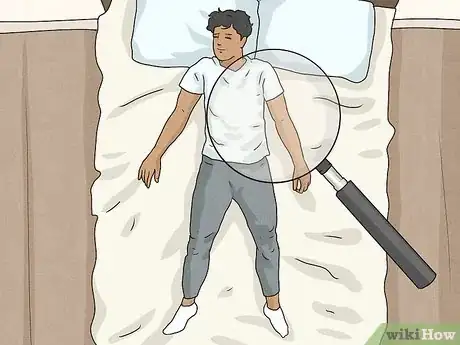

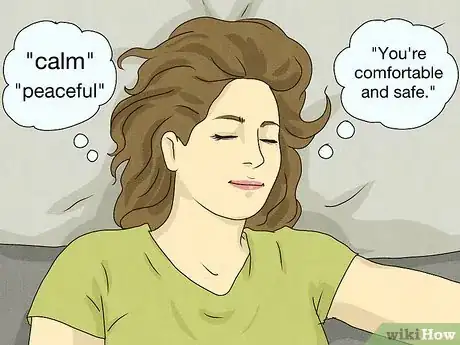
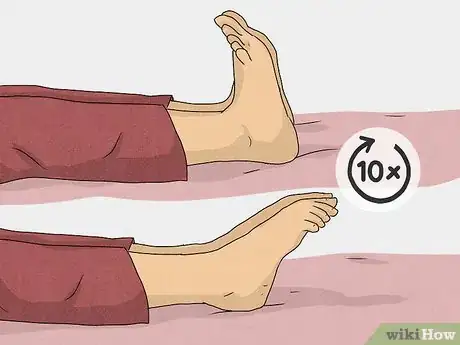
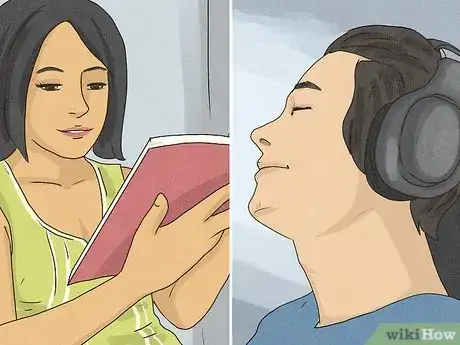
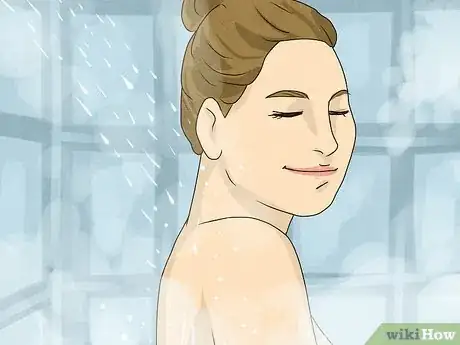



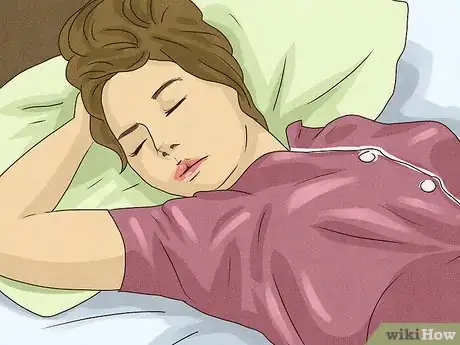
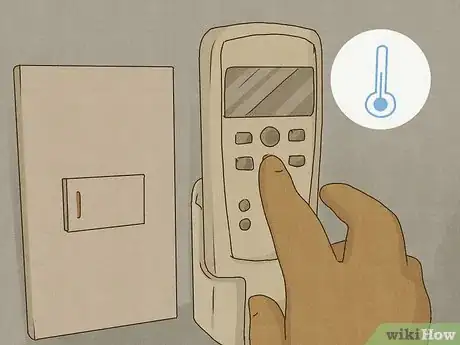

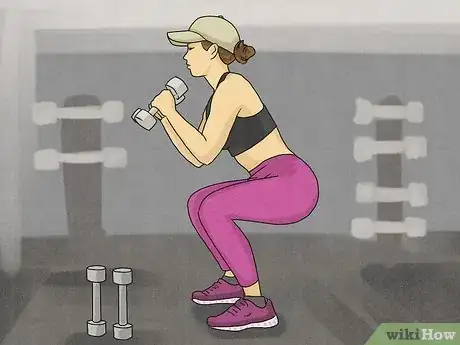
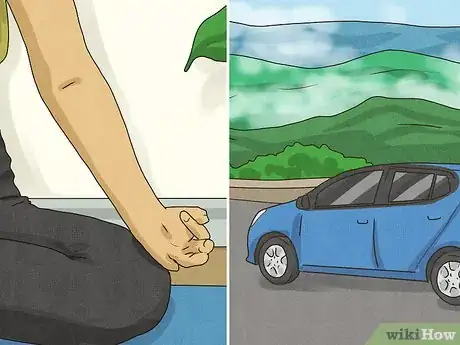

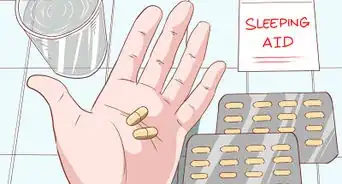


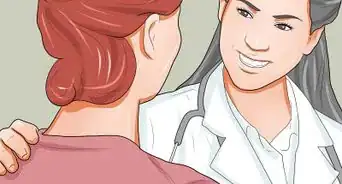

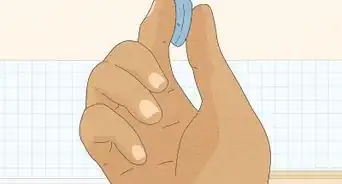
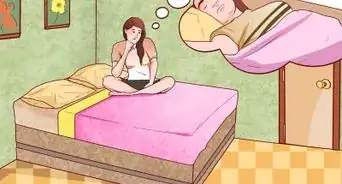














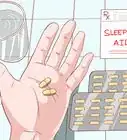

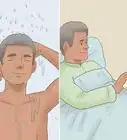




































Medical Disclaimer
The content of this article is not intended to be a substitute for professional medical advice, examination, diagnosis, or treatment. You should always contact your doctor or other qualified healthcare professional before starting, changing, or stopping any kind of health treatment.
Read More...